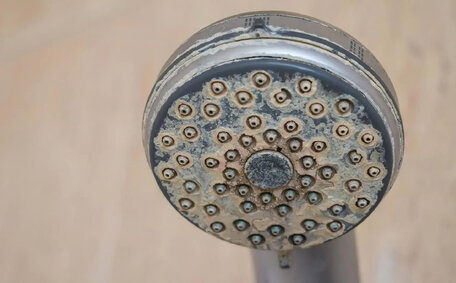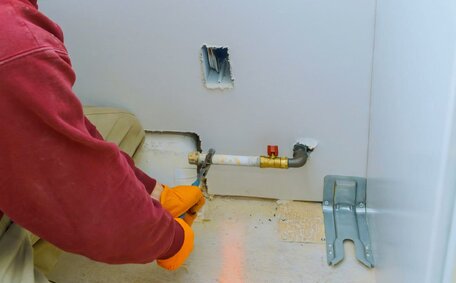How Do Solar Hot Water Systems Work?
Solar hot water systems use the sun’s energy to heat water for household use. They function by circulating either water or a heat-transfer fluid through a solar panel array, transforming solar energy directly into heat on the roof. Consequently, this heated fluid transitions through pipes into insulated storage tanks, enabling efficient water storage while transferring the heat to the water and occasionally aiding in heating the air within the household.
During the day, as sunlight strikes, the collector panels within a solar water heater can heat up the fluid inside. This flexibility ensures hot water availability even during overcast conditions or at night.
There are two types of solar collectors that are commonly used in these systems:
- Flat plate collectors, the most prevalent type, consist of copper tubes encased in an insulated box with a glass cover.
- Evacuated tube collectors - comprising rows of parallel glass tubes, these consist of a glass outer tube and a metallic inner tube. An insulating vacuum is created within the structure to maximise solar heat absorption and minimise heat loss. Slightly more efficient.
Advances in technology allow solar panels to harness and heat water which can effectively cater to a significant portion of hot water needs even in cooler climates. For homeowners looking to harness energy from the sun, a hot water system solar-powered captures solar energy heat to warm water, proving a cost-effective renewable solution.
The Benefits of Solar Hot Water Systems
Solar hot water systems proffer a slew of benefits:
- Energy efficiency - Solar water heaters can deliver up to 90% of water heating needs using solar energy, reducing consumption by up to 65%.
- Cost savings - By harnessing solar electricity instead of traditional electricity or gas, solar hot water systems can shave hundreds off annual energy bills.
- Durability - Solar water heating systems are robust, offering efficient hot water production and can easily last over 20 years.
- Increased property value - Homes with solar hot water systems are typically valued higher.
- Lower emissions - This is precisely how solar hot water heaters manage to produce fewer greenhouse gas emissions than conventional systems.
In the right climate and conditions, The energy from the sun can provide the bulk of the energy needed for gas hot water heating in your home at no cost. With solar PV making strides in the hot water space, units efficiently harnessing this renewable energy offer an eco-friendly method to reduce water heating expenditure.
Lower Energy Bills
Understanding what solar systems can do leads to significant cost savings over time compared to conventional systems that rely solely on electricity or gas for water heating.
The average household spends about $600 per year on water heating. Solar hot water systems, tailored to your needs, can greatly reduce these costs.
Just how much you save will hinge on factors such as your climate, hot water usage, the type of conventional system being replaced, and system size. Generally, regions with more sunshine and appropriately sized systems see larger savings over time.
It’s also worth noting that with rising electricity and gas prices in Australia, the long-term savings of solar hot water will increase over the system’s lifespan. So While solar systems take longer to set up, they offer long-term cost-effectiveness and protection against rising non-renewable energy prices.
Reduced Environmental Impact
One of the most significant environmental perks of solar hot water systems is to reduce your greenhouse gas emissions. Because they offer savings environmental benefits by utilising renewable solar energy rather than fossil fuels like gas or the coal-fired electricity grid, these systems generate significantly fewer emissions over their lifetime.
It’s estimated that installing a solar hot water system can reduce a household’s carbon emissions by around 1.5 to 2.5 tonnes per year - similar to taking one small car off the road. This approach can effectively replace your high-emission heating with a greener alternative, helping to minimise carbon footprint.
Solar hot water heaters produce no direct greenhouse gas emissions. And by displacing carbon-intensive water heating methods, they can also lead to an overall reduction in emissions released into the atmosphere.
With environmental concerns growing globally, solar water heating allows households to utilise free and renewable solar energy while decreasing reliance on fossil fuels. For those desiring a gentler footprint, solar hot water serves as an eco-friendly energy source.
The Drawbacks of Solar Hot Water Systems
While solar hot water systems extend more benefits than traditional energy sources such as energy bill reduction and lower emissions, there are some potential drawbacks to consider as well:
- Higher upfront cost - The initial expenditure of purchasing and installing a solar water heater is more substantial than that for traditional water heaters.
- Performance variability - The amount of hot water produced can vary depending on weather conditions. Backup electric gas heating system components may be necessary at times.
- Roof space required - Solar collectors take up additional roof space for mounting and operation.
- Maintenance - While low, solar collectors require some maintenance like checking fittings and water quality.
It’s important to assess the cons of solar systems against the long-term savings when deciding if solar hot water is appropriate for your home. Consulting a reputable plumber can assist in configuring your solar water heating for maximum efficiency and return on investment.
Higher Upfront Costs
One key consideration with solar hot water systems is that they come with a higher upfront price tag. Installing a solar hot water system costs approximately $5,000 to $10,000, whereas a standard electric storage water heater costs around $1,000 installed. So you’ll need to spend more upfront for a system your household will benefit from initially.
However, solar hot water systems can save $300 to $600 per year on hot water heating costs. Using solar solutions, these savings will likely grow over time amid rising energy prices. And with installed solar hot water systems able to last over 20 years, the long-term savings can offset the higher initial outlay.
There are also government rebates available to help reduce upgrade costs. Plus, improving energy efficiency often increases a home’s resale value. So while solar hot water requires more than a modest upfront investment, the long-term return through lower bills and added home value make it a cost-effective upgrade.
Performance Varies by Climate
The effectiveness of a solar hot water system can vary depending on the climate and weather conditions in your geographical location. Areas blessed with plentiful year-round sunshine will benefit tremendously when they install solar hot water systems. But they can still provide benefits even in cooler climates.
The chief determinant of a system’s efficacy is the solar radiation your area receives. Places with less sunshine may derive a smaller portion of their hot water needs from the sun. To ensure ongoing delivery of heated water, these installations may necessitate a complementary source such as electricity or gas for your water heating during overcast spells or the winter season.
But technological improvements have increased the efficiency of solar hot water systems in different weather conditions. Features like smart controls give the panel water heating systems more intelligence to optimise hot water production by adapting to changing circumstances.
Even in overcast or cold conditions, a correctly sized solar hot water system can offset a significant portion of traditional water heating needs.
Factors to Consider Before Installing Solar Hot Water
Choosing a solar hot water system requires evaluating several factors to ensure it’s the right choice:
- Available roof space - Solar collectors need adequate unshaded north-facing roof space for installation and maximum sun exposure.
- Local regulations - Check council rules, strata and heritage regulations in your area regarding external structures.
- Type system and size - Choose a system type correctly sized to meet your household’s demand based on occupant numbers and hot water usage.
- Water quality - Hard water can result in mineral buildup reducing system efficiency. Treatment may be needed.
- Backup heating - Supplementary gas or electric heating may be needed during cloudy weather.
- Professional installer - Reputable installers understand how to tailor systems to your climate and household needs.
It’s crucial to consult a specialist plumber to ensure the system is appropriately designed for your home’s requirements. They’ll advise the right system and installation for optimal performance.
Expected Return on Investment
An initial investment of $5,000 to $10,000 for a solar hot water system is offset by considerable long-term savings. And with water heaters use of solar technology lasting over 20 years, lifetime savings counterbalance the initial investment.
The return on investment time varies based on climate, system type, usage patterns and energy prices. In optimal conditions with high energy prices, payback may occur within 5 years.
More average conditions see ROI within 10 years. Less ideal circumstances can reach payback in 10-15 years.
Government rebates and incentives also shorten payback periods. And rising electricity prices will likely grow savings over your system’s lifespan. Home resale value typically increases $3,500 to $5,500 thanks to energy upgrades like solar hot water units too.
Selecting a knowledgeable professional to advise on and install the most cost-effective system for long-term benefit is essential. While requiring upfront investment, solar hot water yields long-standing savings for households looking to shrink energy bills and environmental impact.
Government Rebates and Incentives
Federal and some state governments in Australia provide rebates and incentives to make solar hot water system installation more cost-effective. These help make the upgrade more affordable.
The main federal government solar rebate available is the Small-scale Renewable Energy Scheme (SRES), which offers a discount based on the amount of renewable energy a system produces. For a typical residential system, a solar water heater can reduce the total cost by around $2800 in Sydney.
In addition, the NSW government provides a rebate up to $1000 for installing solar water or heat pumps under its Empowering Homes programme. To claim this, you must meet eligibility criteria related to your homes location and which retailer supplies your grid electricity.
Available rebates can reduce the financial burden, making the switch to a solar hot water system more economical. Speak to accredited installers to check available rebates and ensure your new system and installation meets requirements to claim these savings.
Is Solar Hot Water Right for You?
When weighing up whether to install a solar hot water system, the key considerations are your household’s hot water requirements, budget, environmental goals, and current system’s condition.
If your household uses a significant amount of hot water daily, a solar hot water system may be particularly beneficial. The answers influence if solar hot water makes sense.
Is your existing electric water, gas or heat pump system reaching end of life?
Upgrading to a hot water system might require an initial investment of $5,000 to $10,000. But with energy savings of $300 to $600 annually for 20+ years, solar hot water offers long-term payback. Government rebates also improve affordability.
Solar hot water effectiveness varies by climate. Sunnier locations derive the greatest savings, but modern systems work even in cooler areas. Proper sizing and installation optimises performance.
For a personalised consultation on if solar hot water aligns with your household requirements, contact our team at Drummoyne Plumbing. Call 1300 349 338, email jobs@drummoyneplumbingservices.com.au or book an appointment to discuss your options suited to your home and lifestyle.






